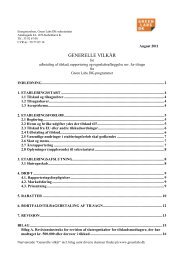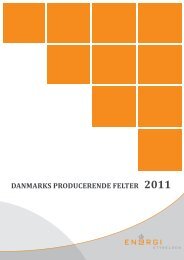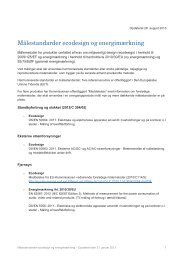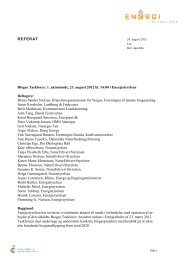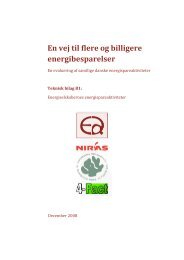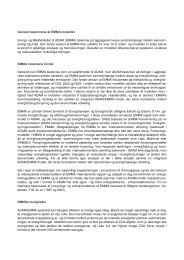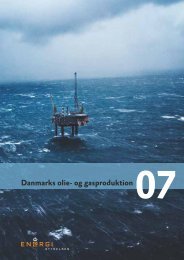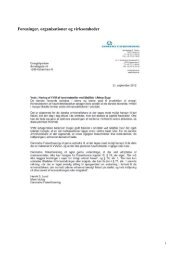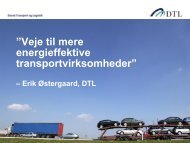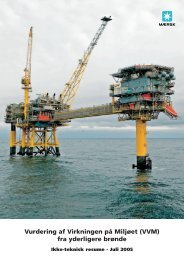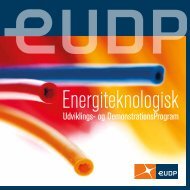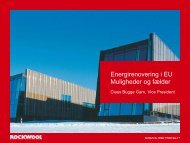Energy Strategy 2050 – from coal, oil and gas
Energy Strategy 2050 – from coal, oil and gas
Energy Strategy 2050 – from coal, oil and gas
You also want an ePaper? Increase the reach of your titles
YUMPU automatically turns print PDFs into web optimized ePapers that Google loves.
Initiatives in the strategy<br />
34<br />
Background The government will<br />
A solid foundation for bio<strong>gas</strong> expansion<br />
Agriculture will play a key role as a green energy supplier<br />
in the transition to fossil fuel independence. In accordance<br />
with the national Green Growth agreement, the<br />
government wants Denmark to aim for the exploitation<br />
of up to 50% of livestock manure for green energy. There<br />
are large unexploited bio<strong>gas</strong> resources, especially in<br />
the form of livestock manure in agriculture. These can<br />
replace natural <strong>gas</strong>, <strong>oil</strong> <strong>and</strong> <strong>coal</strong> for energy purposes.<br />
Greater use of livestock manure will also benefit the<br />
aquatic environment <strong>and</strong> will contribute to reducing<br />
emissions of greenhouse <strong>gas</strong>es <strong>from</strong> agriculture, which<br />
in turn will contribute significantly to meeting Denmark’s<br />
international climate commitments.<br />
The government is monitoring closely the expansion of<br />
bio<strong>gas</strong> <strong>and</strong> has agreed with the Danish People’s Party<br />
to take stock of these developments at the end of 2012,<br />
see the Green Growth agreement. However, even now<br />
the government is presenting a package of initiatives to<br />
support realisation of a 50% use of livestock manure by<br />
2020, whilst taking into account the effects of introducing<br />
the free choice of fuel.<br />
The bio<strong>gas</strong> package proposes raising the start-up aid<br />
<strong>and</strong> introducing a new subsidy system, which will provide<br />
subsidies for a greater variety of uses. It is the government’s<br />
ambition that a greater share of the subsidies<br />
be paid directly to the bio<strong>gas</strong> plants, so that the plants<br />
may receive subsidies for all bio<strong>gas</strong> production irrespective<br />
of ultimate use. Bio<strong>gas</strong> plants will therefore be able<br />
to choose whether to use bio<strong>gas</strong> in their own processes<br />
or sell it off to the highest bidder. In the longer term this<br />
will help improve financial performance in the bio<strong>gas</strong><br />
sector <strong>and</strong> it will enhance the use of bio<strong>gas</strong> for a greater<br />
variety of purposes, e.g. in the natural <strong>gas</strong> grid <strong>and</strong> in<br />
industry. In order to cover the costs of livestock manure<br />
separation, the government will moreover introduce a<br />
subsidy for bio<strong>gas</strong> <strong>from</strong> livestock manure.<br />
<strong>Energy</strong> <strong>Strategy</strong> <strong>2050</strong> <strong>–</strong> <strong>from</strong> <strong>coal</strong>, <strong>oil</strong> <strong>and</strong> <strong>gas</strong> to green energy.<br />
• Introduce a subsidy of DKK 27/GJ for bio<strong>gas</strong> production<br />
<strong>from</strong> 2012. The subsidy will be paid to the<br />
bio<strong>gas</strong> plant regardless of how the plant uses the<br />
bio<strong>gas</strong><br />
• Retain current levels for preferential treatment of<br />
bio<strong>gas</strong> in CHP production, <strong>and</strong> for the average plant<br />
this will correspond to approximately DKK 75/GJ,<br />
including the bio<strong>gas</strong> production subsidy, in 2012<br />
• Introduce a subsidy for bio<strong>gas</strong> in the natural <strong>gas</strong> grid<br />
on equal terms with CHP production, entailing a total<br />
subsidy of DKK 75/GJ, including the bio<strong>gas</strong> production<br />
subsidy, in 2012<br />
• Introduce a subsidy for bio<strong>gas</strong> in industry <strong>and</strong> transport<br />
of net DKK 12/GJ, so that the total subsidy for<br />
bio<strong>gas</strong> in industry <strong>and</strong> transport is raised <strong>from</strong> 2012<br />
by net DKK 39/GJ, including the bio<strong>gas</strong> production<br />
subsidy<br />
• Introduce an additional subsidy of DKK 22.5/GJ for<br />
bio<strong>gas</strong> <strong>from</strong> livestock manure. The subsidy will be<br />
reduced in line with natural <strong>gas</strong> prices<br />
• Increase the aid <strong>from</strong> a start-up construction fund<br />
<strong>from</strong> 20% to 30%<br />
• Set aside funds of DKK 25 million in 2012 to safeguard<br />
the required expansion of the bio<strong>gas</strong> infrastructure<br />
with a view to alleviating any negative consequences<br />
for existing bio<strong>gas</strong> plants in connection<br />
with the introduction of the free choice of fuel<br />
• Allow, on a voluntary basis, changing <strong>from</strong> fixed electricity<br />
settlement to an electricity price supplement for<br />
100% bio<strong>gas</strong>-based plants.



